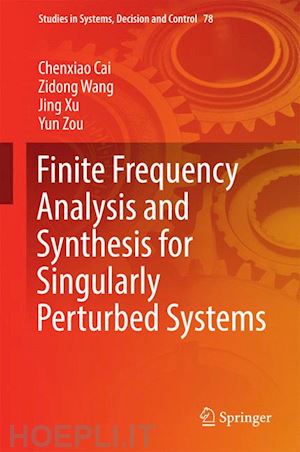

Questo prodotto usufruisce delle SPEDIZIONI GRATIS
selezionando l'opzione Corriere Veloce in fase di ordine.
Pagabile anche con Carta della cultura giovani e del merito, 18App Bonus Cultura e Carta del Docente
This book is a self-contained collection of recent research findings providing a comprehensive and systematic unified framework for both analysis and synthesis for singularly perturbed systems. It paves the way for the gap between frequency-domain-transfer-function-based results and time-domain-state-space-based results to be bridged.
It is divided into three parts focusing on: fundamental background of singular perturbation; general singular perturbation methodologies and time-scale techniques and the theoretical foundation of finite-frequency control; the analysis and synthesis of singularly perturbed systems; and real-world engineering applications implementing the results developed in systems like wind turbines and autonomous-aerial-vehicle hovering.
It also presents solutions to analysis and design problems in terms of linear matrix inequalities. Lastly, it provides valuable reference material for researchers who wish to explore the design of controllers for such systems.
Zidong Wang was born in Jiangsu, China, in 1966. He received the B.Sc. degree in mathematics in 1986 from Suzhou University, Suzhou, China, and the M.Sc. degree in applied mathematics in 1990 and the Ph.D. degree in electrical engineering in 1994, both from Nanjing University of Science and Technology, Nanjing, China.
He is currently Professor of Dynamical Systems and Computing in the Department of Information Systems and Computing, Brunel University, U.K. From 1990 to 2002, he held teaching and research appointments in universities in China, Germany and the UK. Prof. Wang's research interests include dynamical systems, signal processing, bioinformatics, control theory and applications. He has published more than 300 papers in refereed international journals. He is a holder of the Alexander von Humboldt Research Fellowship of Germany, the JSPS Research Fellowship of Japan, William Mong Visiting Research Fellowship of Hong Kong.Professor Wang is an IEEE Fellow. He serves as an Associate Editor for 12 international journals, including IEEE Transactions on Automatic Control, IEEE Transactions on Control Systems Technology, IEEE Transactions on Neural Networks, IEEE Transactions on Signal Processing, and IEEE Transactions on Systems, Man, and Cybernetics - Part C. He is a Fellow of the IEEE, a Fellow of the Royal Statistical Society and a member of program committee for many international conferences.
Jing Xu was born in Jiangsu, China, in 1990. Shereceived the B.S. degree in Science from Nanjing University of Science and Technology, Nanjing, China, in 2012. She is currently pursuing the Ph.D. degree in control theory and control engineering from the School of Automation, Nanjing University of Science and Technology, Nanjing, China. Her current research interests include singularly perturbed systems, fault detection, finite frequency control, and unmanned aerial vehicles. Yun Zou was born in Jiangsu, China, in 1962. He received the B.S. degree in mathematics from Northwestern University, Xi’an, China, in 1983, and the M.S. and Ph.D. degree in control theory and control engineering from Nanjing University of Science and Technology, Nanjing, China, in 1987 and in 1990, respectively. Now he is a Professor in the School of Automation at the Nanjing University of Science and Technology, Nanjing, China. His research interests include differential-algebraic equation system, two dimensional systems and neural networks.










Il sito utilizza cookie ed altri strumenti di tracciamento che raccolgono informazioni dal dispositivo dell’utente. Oltre ai cookie tecnici ed analitici aggregati, strettamente necessari per il funzionamento di questo sito web, previo consenso dell’utente possono essere installati cookie di profilazione e marketing e cookie dei social media. Cliccando su “Accetto tutti i cookie” saranno attivate tutte le categorie di cookie. Per accettare solo deterninate categorie di cookie, cliccare invece su “Impostazioni cookie”. Chiudendo il banner o continuando a navigare saranno installati solo cookie tecnici. Per maggiori dettagli, consultare la Cookie Policy.